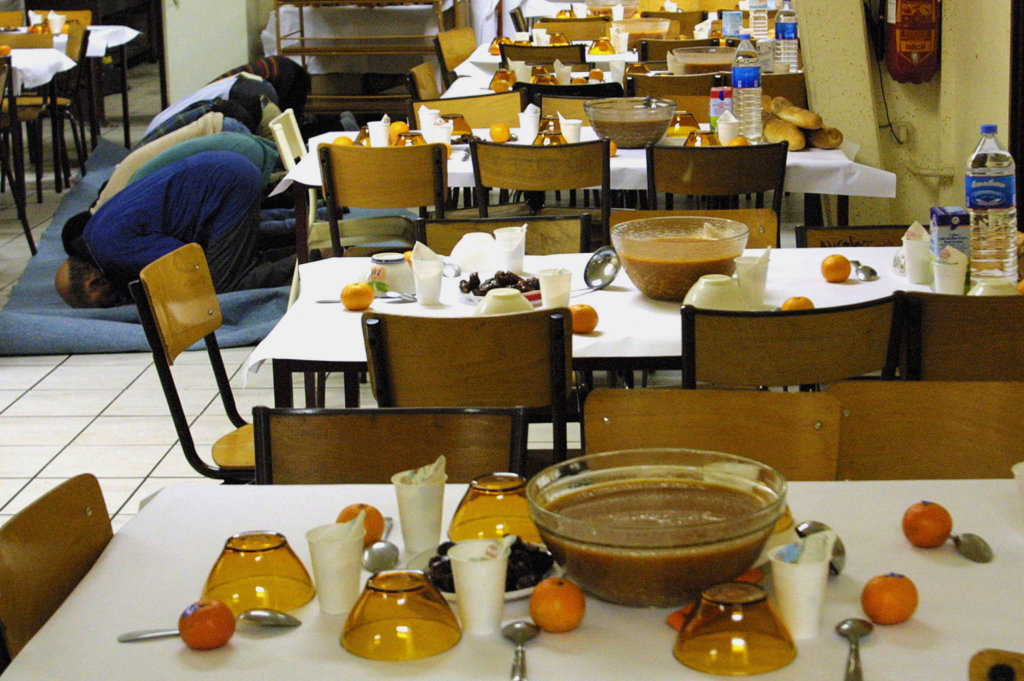
Are you a Muslim student studying abroad and experiencing the holy month of Ramadan away from your family for the first time? Perhaps what you need are some useful Ramadan fasting tips to help you manage your needs and health during this testing month.
Being ill-prepared for Ramadan could spell a recipe for disaster. However, the responsibility doesn’t always have to fall on your shoulders. That’s why religious associations and universities have provided meals and other forms of assistance for Muslim students to lighten the load for them during Ramadan.
Here are six Ramadan fasting tips that you can use to accommodate your fasting needs.
6 Ramadan fasting tips in 2022
Drink plenty of water during Suhoor

Students are recommended to drink plenty of water during Suhoor to stay hydrated throughout the fasting period. Source: Manjunath Kiran/AFP
Perhaps the most essential preparation for a person fasting is to retain as much water in their body as possible, knowing that loss of fluid is inevitable throughout the day when abstaining from food and water.
Strive to drink 500ml to two litres of water during Suhoor to stay hydrated until Iftar.
Limit physical activity

Muslim athletes at the collegiate level should limit their physical activity during Ramadan so as to avoid exerting themselves Source: Katharine Lotze/AFP
If you’re a student-athlete, it is important that you do not overexert yourself with laborious or physical activities while fasting.
This includes cutting down training and physical movements or opting to exercise or train only later in the day when it’s closer to the end of the day’s fast. Athletes may negotiate with their coach or trainer about a more flexible training schedule to accommodate their fast.
Be mindful of what to eat

Students who are fasting during Ramadan are recommended to consume meals that help them stay hydrated and are rich in nutrients. Source: Mohammed Huwais/AFP
It’s normal to crave unhealthy foods for Suhoor and Iftar, but be mindful about what you eat during Ramadan as some meals have nutritional properties which can help store and retain your energy levels through the fasting period.
Among a few food items to avoid during Suhoor are fried foods which are high in salt content. Consuming meals that are salty may cause the person fasting to be thirsty at a quicker rate. Studies have also shown that consuming sodium-rich foods can lead to an increased chance of developing high blood pressure, kidney stones and cardiovascular diseases.
You should also consider avoiding or limiting your caffeine consumption during Iftar and Suhoor, to avoid insomnia and restlessness.
When breaking the fast, consider eating five to six dates that have been soaked in one cup of milk. This aids their body in hydration and helps restore electrolyte balance. Dates are high in potassium, whereas milk is high in calcium and water and is balanced in macronutrients.
Other foods to consider eating during Suhoor include those that are high in protein, starch and fibre. Simple meals such as whole grain bread or oats can keep you full and energised for longer periods.
Other foods to consider include fruit and vegetables, such as avocados, nuts and seeds or nut butters.
Negotiate class and exam schedules

During Ramadan, some university exam schedules may clash with Iftar. As such, Muslim students could negotiate with their lecturers to have their exams rescheduled to accommodate their fasting terms. Source: Kenzo Tribouillard/AFP
Some university classes or final exams may fall during Ramadan and clash with Iftar.
Take the initiative to consult with your university advisor or lecturer about the possibility of choosing an alternative time to take the exam, preferably after Suhoor or Iftar. This will give you the energy to focus and perform better in the exam.
In the case of classes, consider speaking with your lecturers or programme coordinators to opt out of any field trips or assignments that require excessive physical movements or strenuous activities.
Muslims students may congregate at the university prayer room or mosque in between classes to rest, refuel or relax and be provided with an avenue where they aren’t surrounded by students who are eating, provided that they socially distance amid the pandemic.
Suhoor and Iftar on campus

Students who are fasting may negotiate with their university administration to have the campus cafeteria open during Suhoor and Iftar. Source: Thomas Wirth/AFP
Provided that there are enough Muslim students on campus who are fasting, it is possible for a Muslim student society on university grounds to negotiate with the university administration to request for the cafeteria to operate during Suhoor and Iftar.
What if there are only a handful of Muslim students on campus and the university imposes strict operating times at the cafeteria? It is worth noting that universities can typically accommodate students’ needs, provided there is a solid basis for it.
Alternatively, you could always opt to have Suhoor or Iftar at your local mosque or Muslim centre, or even in your dorm.
Learn what sleep schedule works best
What’s your #Ramadan schedule looks like ? pic.twitter.com/I2SjlkWy41
— Enes FREEDOM (@EnesFreedom) May 11, 2021
Navigating a proper sleep schedule during Ramadan is perhaps one of the most challenging aspects of Ramadan. In some countries — and during some seasons (especially during the summer) — there are not many hours between Iftar and Suhoor, making it essential that you find a sleep schedule that does not jeopardise your physical and mental health.
This can be done by getting at least three hours of sleep between Iftar and Suhoor, as well as going more sleep after Suhoor. You may not get eight hours of uninterrupted sleep, but it is better than being sleep deprived, which can affect your studies and daily functioning.










